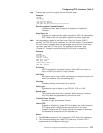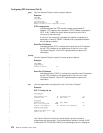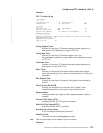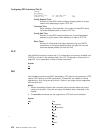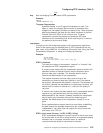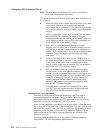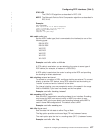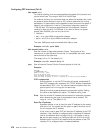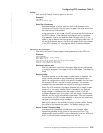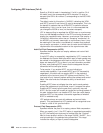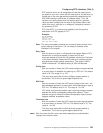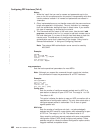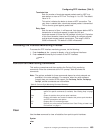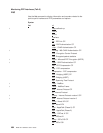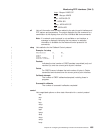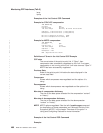ipv6cp
Sets the IPv6 Control Protocol option for the link.
Example:
set ipv6cp
Send Our IP address [no]:
Send Our IP address
Specifies whether or not to send the local IPv6 address to the
remote end of the link. Set this option to yes if the other end of the
link requires the IPv6 address.
If this parameter is set to yes, IPv6CP will send the IPv6 address of
the PPP interface, if the interface is configured with a numbered
IPv6 address, (that is, the address does not begin with 0). If this
option is set to no and the peer sends us a Configure NAK with ::/0
for the IPv6 address option, the 2210 will respond with the address
of the PPP interface if it is configured with a numbered address.
lcp
options
or
parameters
Sets the Link Control Protocol options and parameters for the PPP link.
Example:
set lcp options
Maximum Receive Unit (bytes) [2048]?
Magic Number [yes]:
Peer-to-Local Async Control Character Map (RX ACCM) [A0000] ?
Protocol Field Compression (PFC) [no]?
Addr/Cntl Field Compression (ACFC) [no]?
Maximum receive unit
Sets the maximum size of the information field that are transferred
in a single datagram. The range is 576 to 4089 bytes. The default is
2048.
Magic number
Specifies whether or not the magic number option is enabled. The
magic number provides a way of detecting looped back links in
serial line configurations. When this option is enabled, the link uses
the system clock as a random number generator. The random
numbers that are generated are referred to as magic numbers.
When the LCP receives a Configure Request with a magic number
present (i.e., the magic number option is enabled), the received
magic number is compared with the magic number in the last
Configure-Request sent to the peer. If the two magic numbers are
different, the link is not considered looped back. If the two numbers
are the same, the PPP handler attempts to bring the link down and
up again to renegotiate magic numbers.
Setting this value to Yes enables the magic number option. Setting
this value to No disables the option. The default setting is Yes.
Async Control Character Map
Indicates which characters that the peer must “escape” when
transmitting packets to the router on asynchronous lines. This
allows certain sensitive ASCII control characters, such as XON and
XOFF, to be transmitted transparently over the link.
Configuring PPP Interfaces (Talk 6)
Chapter 33. Configuring and Monitoring Point-to-Point Protocol Interfaces 479
|
|
|
|
|
|
|
|
|
|
|
|
|
|
|
|



